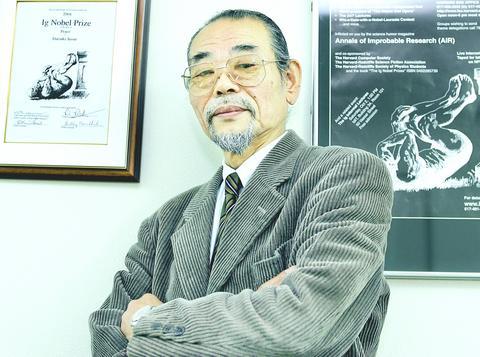Daisuke Inoue could be a billionaire if he had only filed a patent for his invention three decades ago -- the karaoke machine, which has opened up the prospect of stardom, however fleeting, to millions of musical wannabes.
Instead, the man whose creation has become a US$7.5 billion-a-year industry in Japan alone has designed gadgets to wash clothes and kill insects as he tries to put his finger on the next sensation.

PHOTO: AFP
Now aged 64, Inoue said he came up with the device that would become a worldwide social lubricant when he was a fumbling keyboardist accompanying customers at a club in the western Japanese city of Kobe.
"A driving force [for the invention] was my laziness as it was hard to master new songs one after another," Inoue told reporters in an interview.
Inoue, with a smooth deep voice, graying slicked-back hair and a ponytail, has never been able to read music even though he started earning money as a drummer when he was 16.
"Accompanying tone-deaf singers was no problem. What was toughest for me was to remember by heart several new songs every month because I couldn't read music," said the inventor of karaoke.
Inoue first got the idea for a karaoke machine in 1971 after a club customer asked him to join him on a weekend company trip as he wanted to sing to Inoue's keyboard. Inoue could not skip work at the club, so he made a tape of instrumental music for him.
Later that year, he invented the original karaoke machine, called "8 Juke," based on a car stereo and equipped with a microphone, amplifier and coin box that played music recorded on eight-track cartridge tapes. Inoue was 31 at the time.
The machine proved to be an instant hit.
Though rival devices by firms such as Daiichikosho, now the top karaoke company, appeared within three years, Inoue saw 12 good years selling tape-based karaoke machines.
His company's fortune waned with emerging laser disc-based machines in the mid-1980s. He survived by turning the company from a karaoke machine maker to a trading firm.
"I went to Daiichikosho with which we had been battling fiercely and asked them to let us handle their machines," Inoue said.
His company came to boast annual sales of ?10 billion (US$95 million). But the lifestyle proved too much for Inoue.
"It was luxury-induced depression. I had been a salesman talking directly to customers but was suddenly given a monthly salary of ?3.5 million and no real job," he said.
"I began to suffer head-aches and was unable to move to go to office," he said, recalling the months in the early 1990s he served as nominal "chairman" of the company.
He broke out of his depression by leaving the company, running around with his dogs and establishing an industry group to promote his invention, the All-Japan Karaoke Industrialist Association.
His latest invention is the "New Aqua Trio" pot which is purported to electrolyze water for washing laundry, cleaning dishes and even rinsing mouths without detergent or chemicals.
Costing ?399,000 (US$3,800), the home-use pot is touted to bring about "a cleaning revolution."
And this time, Inoue has wisely decided to patent the product, both in Japan and internationally.

Taiwan Semiconductor Manufacturing Co (TSMC, 台積電) last week recorded an increase in the number of shareholders to the highest in almost eight months, despite its share price falling 3.38 percent from the previous week, Taiwan Stock Exchange data released on Saturday showed. As of Friday, TSMC had 1.88 million shareholders, the most since the week of April 25 and an increase of 31,870 from the previous week, the data showed. The number of shareholders jumped despite a drop of NT$50 (US$1.59), or 3.38 percent, in TSMC’s share price from a week earlier to NT$1,430, as investors took profits from their earlier gains

In a high-security Shenzhen laboratory, Chinese scientists have built what Washington has spent years trying to prevent: a prototype of a machine capable of producing the cutting-edge semiconductor chips that power artificial intelligence (AI), smartphones and weapons central to Western military dominance, Reuters has learned. Completed early this year and undergoing testing, the prototype fills nearly an entire factory floor. It was built by a team of former engineers from Dutch semiconductor giant ASML who reverse-engineered the company’s extreme ultraviolet lithography (EUV) machines, according to two people with knowledge of the project. EUV machines sit at the heart of a technological Cold

Taiwan’s long-term economic competitiveness will hinge not only on national champions like Taiwan Semiconductor Manufacturing Co. (TSMC, 台積電) but also on the widespread adoption of artificial intelligence (AI) and other emerging technologies, a US-based scholar has said. At a lecture in Taipei on Tuesday, Jeffrey Ding, assistant professor of political science at the George Washington University and author of "Technology and the Rise of Great Powers," argued that historical experience shows that general-purpose technologies (GPTs) — such as electricity, computers and now AI — shape long-term economic advantages through their diffusion across the broader economy. "What really matters is not who pioneers

TAIWAN VALUE CHAIN: Foxtron is to fully own Luxgen following the transaction and it plans to launch a new electric model, the Foxtron Bria, in Taiwan next year Yulon Motor Co (裕隆汽車) yesterday said that its board of directors approved the disposal of its electric vehicle (EV) unit, Luxgen Motor Co (納智捷汽車), to Foxtron Vehicle Technologies Co (鴻華先進) for NT$787.6 million (US$24.98 million). Foxtron, a half-half joint venture between Yulon affiliate Hua-Chuang Automobile Information Technical Center Co (華創車電) and Hon Hai Precision Industry Co (鴻海精密), expects to wrap up the deal in the first quarter of next year. Foxtron would fully own Luxgen following the transaction, including five car distributing companies, outlets and all employees. The deal is subject to the approval of the Fair Trade Commission, Foxtron said. “Foxtron will be